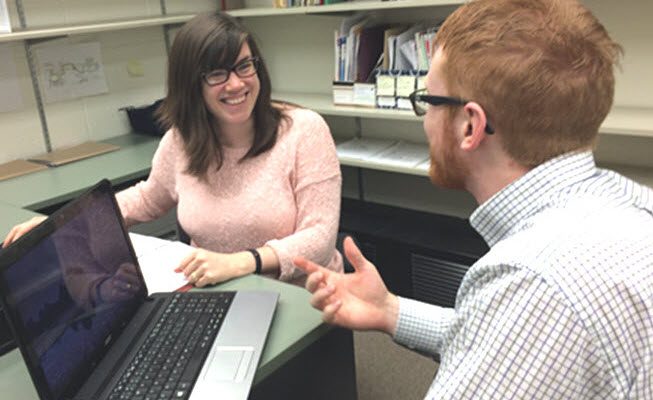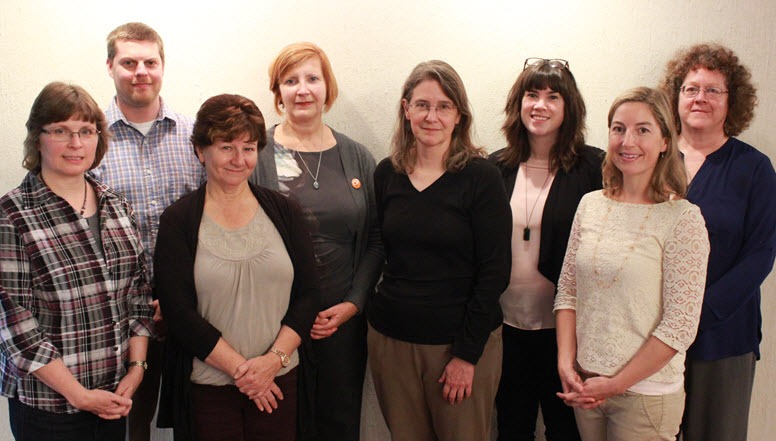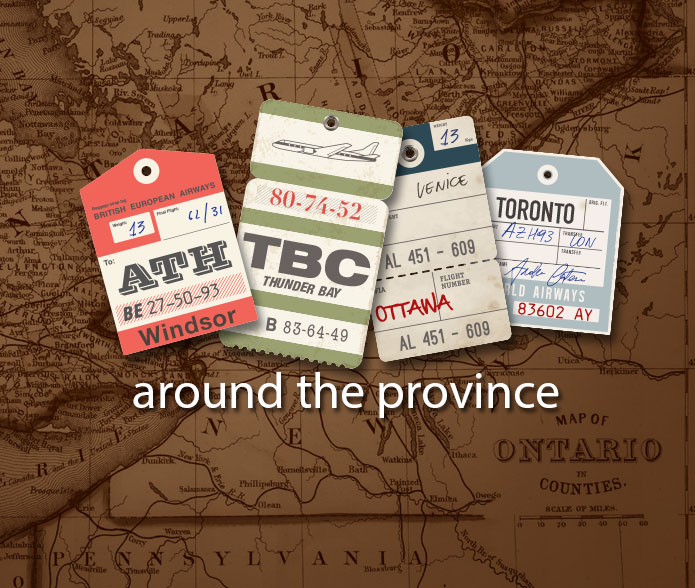Learn about a librarian’s research into 2SLGBTQ+ Libraries and Archives, preserving queer history, and current activism efforts.

Getting personal: Personal Librarian programs at two Ontario campuses
Academic librarians are continuously striving to connect with students – whether in a classroom, answering a chat reference question or providing one-on-one research help. But it’s not always easy to make those connections: faculty may not invite librarians into class, and library anxiety or lack of awareness may prevent students from asking for help. Enter the idea of Personal Librarian programs, which pair students with librarians who contact them regularly about helpful library resources and services and answer their questions. Perhaps most importantly, Personal Librarians provide a friendly, welcoming face to help students successfully navigate the complexities of an academic library. This article highlights Personal Librarian programs at the University of Toronto’s Ontario Institute for Studies in Education (OISE) and Brock University.
***
Brock University’s James A. Gibson Library has offered Personal Librarian programming since 2013-14, as part of a new research help model to provide responsive, point-of-need services – both virtual and face-to-face. Overall, it is a low-effort, high-return program – most Personal Librarians spend about three hours per academic term working on messaging and replies, while the workload is a bit higher for the three-person planning team. In return, librarians are able to connect our students with Library resources and services to help them succeed with assignments and exams.

The program has also helped the Library build positive relationships with campus partners. The Personal Librarian team works with the Registrar’s office to obtain student contact information, while University Marketing and Communications provides an account for Active Campaign: email marketing software which provides useful evaluation analytics. Marketing and Communications also designed custom email templates that make each Personal Librarian message visually appealing.
For 2015-16, the program has grown to include nine liaisons as Personal Librarians, 20 academic departments/programs, and 3,045 students – mostly undergraduate, but several graduate programs are also included. Personal Librarians send three messages each term, focusing on services or resources relevant to that point in the academic year: for example, exam study support in late November.
Helpful messages
The program started small, with a pilot targeting 191 first-year students in Health Sciences programs and one liaison librarian as their Personal Librarian. While no students directly replied to emails from their librarian in the pilot, an evaluation survey demonstrated strong positive feedback from students. Accordingly, the Library ran an expanded Personal Librarian program in 2014-15 which included 1,287 students, 14 programs/departments and eight liaison librarians. Again, direct contact from students was minimal: 28 replies were received to a total of 105 messages. However, responses and comments in a year-end evaluation survey were highly positive:
- 79 % of respondents said the messages were helpful
- 87 % agreed that emails from their Personal Librarian were the best way to inform them of Library services and resources
- 78 % said the messages made them more confident in using the Library
“My personal librarian provided a wonderful and important overview of the Library and I gained more confidence with using the services offered,” said one student. Another commented that “I would say, it is best to have a personal librarian.”
In addition to tracking replies and surveying students, Brock’s Personal Librarian program incorporates another set of assessment metrics: email marketing benchmarks. It may seem strange to use corporate marketing metrics to assess a Library program, but in fact, Personal Librarianship meets the criteria of email marketing — which, at its best, uses customized, targeted email messages to develop relationships with potential customers. While businesses strive to create individual relationships with clients to entice them to buy a product, libraries try to build personal relationships with students to encourage them to use Library services and resources.
Email metrics
The email metrics for Brock’s 2014-15 Personal Librarian program were quite positive: messages to students had an average open rate of 20 % and an average click-through rate of 5%. This compares favourably to 2014 email marketing benchmarks for the education sector in Canada, which had a mean open rate of 20.9 % and a click-through rate of 2.9 %[1]. However, due to the outdated student email client in use at the time, it is likely that the 2014-15 open rates were under-reported. In 2015-16, Brock students began using Office 365 – and the open and click-through rates for Personal Librarian messages have skyrocketed. For the fall term, the average open rate for messages was 72 %, with program-specific rates ranging from 50 % to 95 %; click-through rates were more variable, with zero opens for a few programs each month contrasting with rates of up to 10% for others.
These email metrics are encouraging: we look forward to seeing the results of our 2015-16 evaluation survey – and planning for next year’s program.
***
The Ontario Institute for Studies in Education (OISE) Library at the University of Toronto (U of T) launched its Personal Librarian Program (PLP) for all incoming OISE graduate students in the fall of 2014. The OISE initiative is part of and builds on the success of a broader University of Toronto Libraries Personal Librarian Program launched in 2011. The OISE program is designed to address the particular needs of graduate students in education .

Approximately 970 incoming graduate students at OISE received four emails over the course of the academic year from one of four OISE personal librarians. The emails were tailored to the time of year and included links to library resources and friendly reminders about library research support services. The inaugural year of the program was a success: OISE librarians engaged in 243 direct email interactions with students over the course of the academic year.[2] An outgoing survey also indicated that responding students (n=180) were very enthusiastic about the project and the personalized support.
However, OISE librarians wanted to know more than the details captured in the evaluation survey. What were students asking? What were their most pressing library needs? A simple content analysis of the actual email interactions provided an overview of the types of questions students had asked over the course of the 2014-15 year.[3]
Research-related inquiries
Perhaps not surprisingly, the analysis showed that the main theme — across all questions and across all masters and doctoral programs at OISE — was research-related inquiries.[4] A more fine-grained exploration of these research questions revealed that, while these students have strong disciplinary knowledge, they still required individual help in developing advanced search strategies and finding the right tools to complete their searches.
The analysis helped reinforce the importance of and demand for customized services such as individual consultations and advanced research support for graduate students. Additionally, the analysis also provided some insights into simple things that could be done to improve the OISE PLP service: librarians adjusted the timing of the emails and created a video tutorial to address a common e-resources problem.
Overall, the OISE Library PLP experience suggests that, tailored with careful attention to the research-focused needs of graduate students, PLP outreach initiatives can be a valuable conversation starter for graduate students and librarians. The OISE Library is now in the second year of its personal librarian program and response rates have already surpassed those of 2014-15.
***
The two programs highlighted here indicate that personal librarian initiatives show great promise for creating student-librarian connections, whether geared toward graduate students in one faculty (OISE) or rolled out more broadly across an entire campus (Brock).
Furthermore, we believe that the varied approaches to design, implementation, and analysis of these two programs point to a fertile ground for further discussion and comparison about PLPs across university and college libraries across Ontario.
For more information about Brock’s Personal Librarian program, please contact Elizabeth Yates eyates@brocku.ca
For more information about the OISE PLP, please contact Jenaya Webb.
Bridgette Kelly is a TALint Student at the OISE Library, University of Toronto. She is finishing her final semester at the University of Toronto iSchool with a dual concentration in LIS and ARM. You can reach her bridgette.kelly[at]utoronto.ca
Jenaya Webb is a Public Services Librarian at the OISE Library, University of Toronto. She can be reached at jenaya.webb [at] utoronto.ca or @jenayawebb
Elizabeth Yates is Editor-in-Chief of InsideOCULA and Acting Head, Liaison Services/Scholarly Communication Librarian at the James A. Gibson Library, Brock University. She can be reached at eyates@brocku.ca – or Tweet her @LibraryWriteHer
[1] Silverpop. 2014 Email marketing metrics benchmark study. http://www.silverpop.com/marketing-resources/white-papers/all/2014/email-metrics-benchmark-study-2014/
[2] Librarians participated in 243 “interactions” with students. These interactions do not represent individual questions or individual students. Rather, they represent the number of times we replied to an email (or email thread) using the OISE Personal Librarian Program tracking system.
[3] To be consistent with other personal librarian and reference services analysis completed at the U of T, the OISE team used an adapted version of a coding framework designed by Scholars Portal for the Ask a Librarian virtual reference service (see Logan, Maidenberg, and Spence, 2013 http://ala13.ala.org/node/12103).
[4] 46% of all questions asked were research-related. Other broad themes included questions about citing and citation styles (11%), accessing e-resources and known items (8%), as well as various miscellaneous questions (10%). Notably, 25% of the interactions were coded as introductions, thank-yous, and other positive feedback from participants.
Keywords: Brock University, content analysis, email marketing, James A. Gibson Library, OISE, Personal Librarian, University of Toronto


